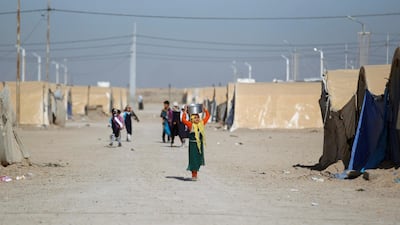The number of Iraqis returning to their areas of origin has surpassed those who remain internally displaced for the first time since December 2013, the International Organisation for Migration has said.
At the end of last year IOM identified 3.2 million people who had returned to their homes since January 2014, compared with 1,370,862 at the end of 2016 and 468,780 at the end of 2015.
The war with ISIL has led to the displacement of nearly 6 million Iraqis since January 2014, with 3.4 million in March 2016 being the highest number of people displaced at any one time. At the end of last year 2.6 million people remained internally displaced.
"The significant return trends monitored in the last few months are largely due to the retaking of all Iraqi areas by the Iraqi Security Forces," IOM media and communications officer Sandra Black told The National. "This, coupled with the improved security situation, has encouraged large groups of displaced individuals to return to their place of origin."
It marks the first time since ISIL's 2014 blitzkrieg in Iraq that the number of people returning to their towns and cities has surpassed those still internally displaced. More than 1.2 million people have returned to Anbar province, while 30 and 14 per cent of the population has returned to Nineveh and Salah Al Din provinces respectively.
The three provinces were the worst affected by ISIL's occupation, accounting for 86 per cent of the internally displaced population. Anbaris were the first to suffer the brutal rule of the extremist group, beginning in late 2013, while Nineveh's Yazidis were subject to systematic persecution, killing and enslavement in the summer of 2014.
_______________
Read more:
Displaced Iraqis forcibly returned home, where ISIL booby-traps abound
Down but not out: ISIL will regroup and rise again
______________
According to IOM, intra-governorate returns of internally displaced persons (IDPs) account for 55 per cent of returnees. The most significant concentration of IDPs is currently in Nineveh (57 per cent), which has an intra-governorate internally displaced population of 97 per cent.
Images taken this month in Wana village, west of Mosul, show children in colourful garb carrying zip-locked bags stuffed with bright acrylic blankets, often found in Iraqi households. Other returnees lug large rolled-up carpets and IOM non-food item kits back to their homes after months or sometimes even years of displacement.
A large number of houses were either totally or partially destroyed during the violent battle between ISIL and coalition-backed Iraqi forces. Countless buildings can be seen to bear the scars of the violent conflict.
According to the IOM, nearly one third of returnees are reported to have returned to houses that have suffered significant to complete damage and 60 per cent to moderately damaged residences. "[In] the long term, the intention to return is high among IDPs. [In] the short term, the preference is to voluntarily integrate locally," said the IOM's Ms Black.
The latest figure for returnees comes just days after refugees and aid workers revealed that a large number of displaced Iraqis were being forcefully returned to their areas of origin to ensure that the country's upcoming election takes place on time. People must be in their area of origin to vote and if they do not return home, this could delay the election.
Aid workers estimated that between 2,400 and 5,000 people had been forcibly returned by the Iraqi army between November 21 last year and January 2.
"These returns are not safe," one aid worker told Reuters. "Even those who don't openly resist really have no other choice. They cannot really say no to a bunch of people with guns."
Displaced people who return home prematurely are likely to face a number of obstacles to reintegration.
"UNHCR strongly discourages return movements until necessary services are in place, and continues to advocate with authorities to facilitate return only when the necessary minimal conditions are met, and to promote the availability of information to IDPs about conditions in their home areas," UNHCR spokesperson Kate Pond told The National.
While most displaced Iraqis want to return to their homes, doing so prematurely exposes them to possible death from booby-traps or acts of vigilantism.
“Sustainable return is not just about bricks and mortar," said UNHCR representative to Iraq Bruno Geddo. "Rebuilding and restoring communities is a holistic process, covering everything from clearing explosive hazards to repairing damage to infrastructure to restoring basic services, and facilitating social cohesion so that communities can again begin to flourish.”

